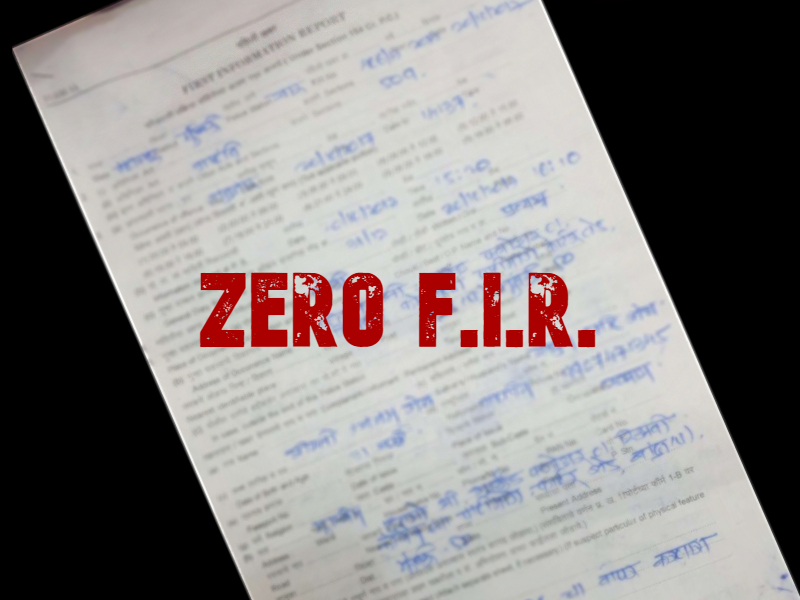The Criminal Procedure Code has been replaced by the Bharatiya Nagarik Suraksha Sanhita (BNSS). So now the provisions of registration of a cognizable offence is now provided under section 173 of BNSS instead of Section 154 CrPC. This is with regards to reporting the commission of a crime. The first step in pursuing justice is the reporting of a crime. One of the most significant legal mechanisms in the criminal justice system today is the Zero FIR procedure, which aims to improve the effectiveness and accessibility of law enforcement in addressing crimes. Victims frequently run across a number of obstacles and difficulties while attempting to file a formal complaint or FIR against an individual. Zero FIR has been introduced to us in order to guarantee that cases are registered as soon as possible.
Zero FIR: What Is It?
Regardless of the jurisdiction in which the incident has happened, victims can report a crime under the Zero FIR system at any police station. This clause will guarantee prompt action, particularly in situations that call for quick attention, such as kidnapping or sexual assault, so that people won’t have to waste time filing a complaint when help is urgently needed.
The relevant police station with authority over this matter may thereafter receive the FIR filed through this system. The wording should make it obvious that a case filed through this mechanism won’t have a number assigned to it at the time the First Information Report is filed.
This was put forward in response to the Justice Verma Committee’s (2012) recommendations, which were formed in the wake of the 2012 Nirbhaya Gangrape Case. Although it isn’t specifically stated in Section 154 of the Criminal Procedure Code, it was later made feasible to file FIRs without any jurisdictional restrictions via a criminal law modification later in 2013. Numerous court rulings have addressed the significance of filing a Zero FIR. For example, the Delhi High Court declared in Satvinder Kaur v. State (1999) that a woman is entitled to file a complaint from any location other than the scene of the crime. The Supreme Court ruled in Lalita Kumari v. Govt. of U.P. (2014) that police must file a formal complaint report (FIR) as soon as they learn of the commission of a cognizable offense and that preliminary inquiries are not allowed in cases where serious offenses, such as rape or murder, are committed. Through the filing of a Zero FIR, this ruling guarantees victims receive quick aid. In State of Andhra Pradesh v. Punati Ramulu and Ors, the court noted the police constable’s dereliction of duty and stressed his legal duty to document the information and thereafter forward it to the appropriate police station. In accordance with the recommendations of the Justice JS Verma Committee, public personnel who neglect to record information pertaining to a cognizable offence are subject to penalty under Section 166A of the Indian Penal Code.
Steps to lodge FIR under Bharatiya Nagrik Suraksha Sanhita-
Step 1: The police station receives the complaint.
Step 2: Regardless of the jurisdiction, the required officer must record the complaint details in Zero FIR and register the case as Zero FIR upon receiving information about the commission of a cognizable offence.
This must be completed in compliance with BNSS Section 173(1).
173. (1) Every information relating to the commission of a cognizable offence, irrespective of the area where the offence is committed may be given orally or by electronic communication and if given to an officer in charge of a police station,—
After the registration of Zero FIR, they must proceed to conduct the preliminary enquiry into the case according to Section 173(3)-
(3) Without prejudice to the provisions contained in section 175, on receipt of information relating to the commission of any cognizable offence, which is made punishable for three years or more but less than seven years, the officer in-charge of the police station may with the prior permission from an officer not below the rank of Deputy Superintendent of Police, considering the nature and gravity of the offence,—
(i) proceed to conduct preliminary enquiry to ascertain whether there exists a prima facie case for proceeding in the matter within a period of fourteen days; or
(ii) proceed with investigation when there exists a prima facie case.
Step 3- Once the FIR is registered and all the requirement under section 173 have been fulfilled, the copy of this must given to the informant
Step 4- The Zero FIR will be forwarded to the police station that has jurisdiction over this case.
Step 5- The concerned police station receives it and registers it as any other regular FIR.
Step 6- The FIR gets assigned to an investigation officer and the investigation starts (as per the standard procedure set by BNSS)
Therefore, it is indisputable that the idea of Zero FIR is a useful instrument for the nation’s women to combat crimes like rape and sexual harassment. subsequently, the inclusion of Zero FIR in India’s new criminal legislation represents a revolutionary step in the modernization of the legal system in that nation. In order to guarantee that victims receive prompt assistance and justice, a proper implementation of Zero FIR can greatly improve the effectiveness of the criminal judicial system. When taken as a whole, these changes improve the process’s candidness and competence while maintaining victim-centered justice.
By- Sri Moukthika

